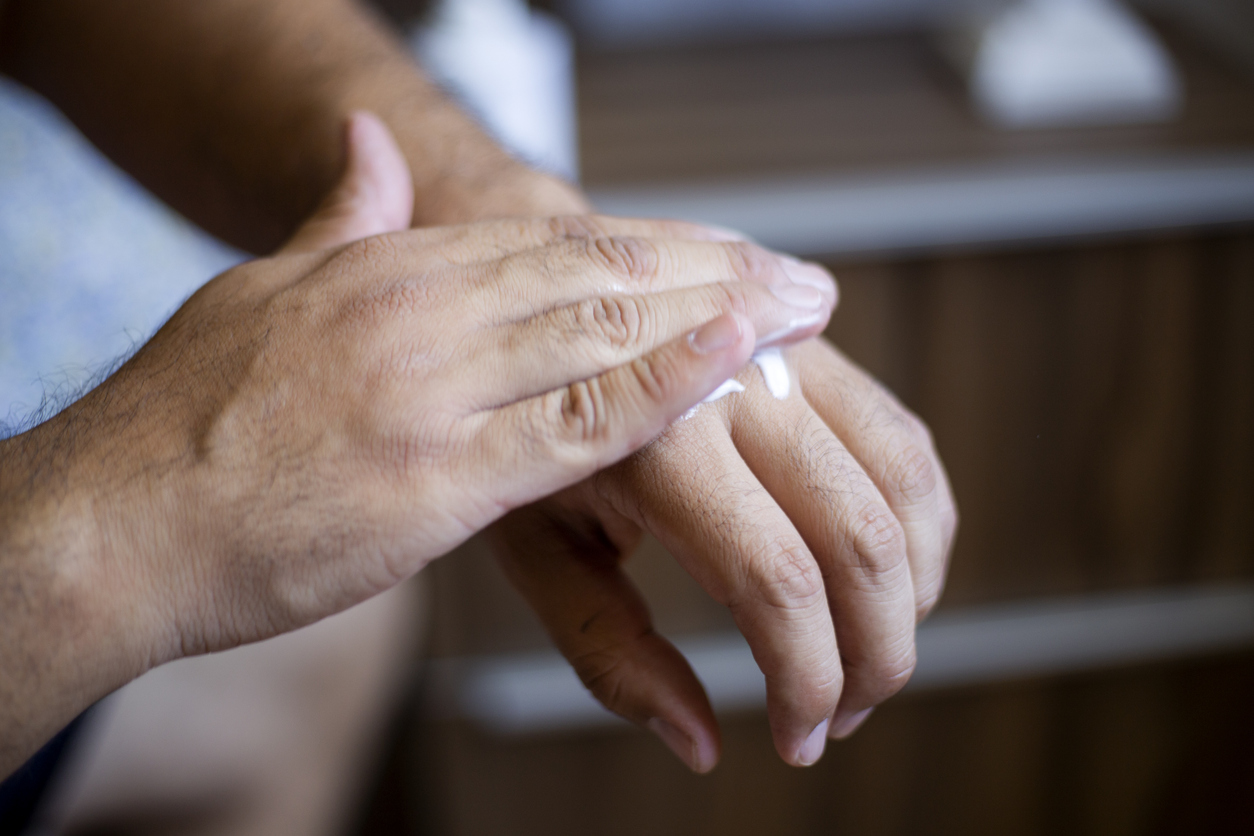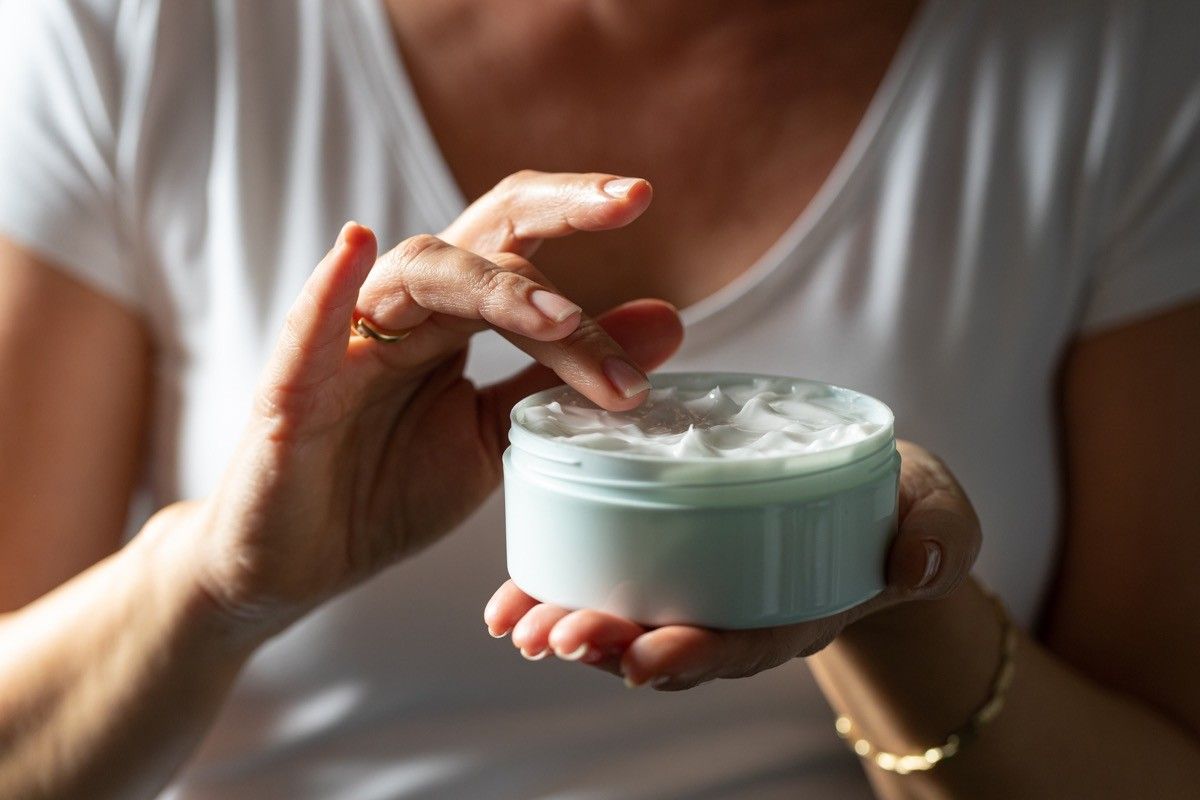What Happens When You Use Too Much Hand Cream

Winter can be tough on your hands, thanks to plunging temperatures and frequent hand washing during the cold and flu season. Thankfully, the right hand cream can help. However, some experts say that using too much hand cream can backfire, causing an unwanted effect that can leave your skin more dependent on pricey products than you’d like.
Read on to learn what happens when you use too much hand cream, which hand creams are best for frequent use, and which ingredients you should avoid at all costs.
READ THIS NEXT: If You Notice This On Your Skin, Get Checked for MS.
When you use too much hand cream, your skin may produce less moisture on its own.

Moisturizing your hands with the right cream can help your skin stay smooth, soft, and free of irritation. It can also help promote elasticity in your skin, giving it a youthful appearance for longer. However, experts warn that when it comes to using hand cream, it’s possible to have too much of a good thing.
“It’s very important to moisturize your skin, but applying too much can have a negative effect on your skin. If you use too much moisturizer, over time it makes your skin lazy, which can encourage your skin to produce less moisture on its own,” explains the cosmetics company Garnier USA.
“Over-moisturizing signals to your skin that it has enough water, lipids and protein (skin’s building blocks) and that it can slow down the production of these important skin nutrients. This can turn into a vicious cycle in which your skin appears dry because it’s no longer producing necessary nutrients which causes you to moisturize more,” their experts add.
READ THIS NEXT: This Popular Beauty Product Spikes Cancer Risk by 155 Percent, New Study Finds.
Look for moisturizers with these ingredients, one dermatologist recommends.

Susan Bard, MD, a board certified dermatologist based in New York City, tells Best Life that some of her favorite creams for dry hands include Neutrogena Norwegian Formula, O’Keeffe’s Working Hands, and Aveeno Eczema Therapy Itch Relief Balm. “Thick emollient moisturizers tend to contain occlusive ingredients such as petrolatum, dimethicone, beeswax, lanolin, etc. that help prevent moisture loss from the skin,” Bard explains.
However, she also acknowledges that heavier creams may not be right for everyone. “They can feel sticky and also clog pores, leading to folliculitis and miliaria on certain parts of the body,” she says, noting that this is less likely to occur on the hands than on other body parts.
For people who prefer a lighter consistency, Bard recommends “humectant-based moisturizers, which contain ingredients that pull water into the skin like hyaluronic acid or glycerin without leaving behind a greasy residue.”
These other ingredients can do more harm than good.

Of course, not all hand creams are created alike—some contain ingredients that are downright unhealthy. In particular, butylated hydroxyanisole (BHA), DMDM hydantoin, added fragrance, parabens, phthalates, triethanolamine, and retinyl palmitate are some of the worst offenders, Prevention Magazine reports.
These chemicals and preservatives come with a range of possible problems: BHA is believed to be carcinogenic, DMDM hydantoin is known to release formaldehyde, and parabens are believed to disrupt hormones. By opting for organic ingredients, you may be able to avoid these frightening side effects.
For more health news sent directly to your inbox, sign up for our daily newsletter.
Try these tips for keeping your hands silky smooth.

Besides moisturizing with hand creams, several other simple steps can help your hands stay soft and smooth. Board-certified dermatologist Corey L. Hartman, MD, Founder of Skin Wellness Dermatology in Birmingham, Alabama, says you can protect your hands between moisturizing sessions by following these simple tips: “Consider getting a humidifier, as it can help battle the dryness from the weather and from constant washing (for home and office). Wear winter gloves when you go outdoors, and use gloves if you wash your dishes or clean, to protect your hands,” he recommends.
Hartman adds that by moisturizing deeply at night, you may be able to rely less heavily on moisturizers during the day. “One of my favorite things to do is to put on Vaseline ointment and put on gloves (disposable clear food prep gloves) or an old sock to bed to really moisturize my skin—it doesn’t have to be fancy,” he tells Best Life.